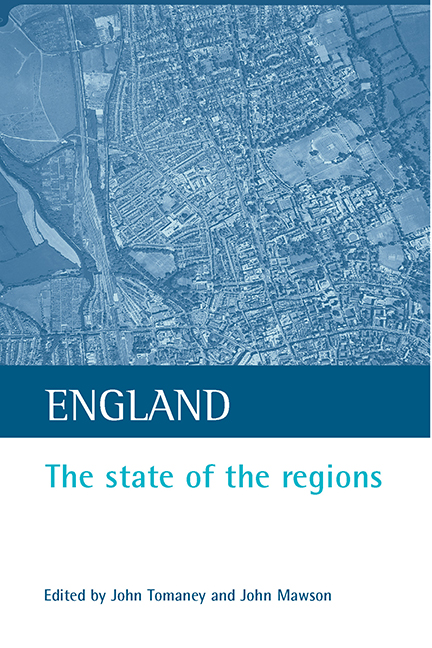Book contents
- Frontmatter
- Contents
- List of tables and figures
- Acknowledgements
- List of contributors
- one Introduction
- two Regional government in England: reviewing the evidence base
- three New Labour and the evolution of regionalism in England
- four Yorkshire (and the Humber)
- five Institutional collaboration in the West Midlands region
- six England's North West
- seven The South West
- eight Regionalism in the East of England
- nine The South East region?
- ten Regionalism in North East England
- eleven Regional strategy development in the East Midlands
- twelve The problem of regional governance
- thirteen Elected regional government: the issues
- fourteen Barnett plus needs: the regional spending challenge in Britain
- fifteen Conclusion: prospects for regionalism
- Index
- Also available from The Policy Press
fifteen - Conclusion: prospects for regionalism
Published online by Cambridge University Press: 20 January 2022
- Frontmatter
- Contents
- List of tables and figures
- Acknowledgements
- List of contributors
- one Introduction
- two Regional government in England: reviewing the evidence base
- three New Labour and the evolution of regionalism in England
- four Yorkshire (and the Humber)
- five Institutional collaboration in the West Midlands region
- six England's North West
- seven The South West
- eight Regionalism in the East of England
- nine The South East region?
- ten Regionalism in North East England
- eleven Regional strategy development in the East Midlands
- twelve The problem of regional governance
- thirteen Elected regional government: the issues
- fourteen Barnett plus needs: the regional spending challenge in Britain
- fifteen Conclusion: prospects for regionalism
- Index
- Also available from The Policy Press
Summary
The rise of regionalism?
The aim of this book has been to cast a spotlight over the current state of regionalism in England. This inevitably presents only a snapshot of an evolving situation. The varied contributions in the book, however, make clear that the pattern of regionalism is highly uneven. At the same time, there are forces at play that are likely to ensure that regionalism remains a part of the political scene in England. In fact, by mid-2002, there was evidence that the interest of the English in regionalism was starting to grow. Indeed, a poll commissioned by the BBC in March 2002 showed growing support for regional government across England. Nearly two thirds of the population (63%) were in favour of elected regional assemblies, with support even higher in the four regions of the West Midlands (73%), the North East (72%), North West (72%) and Yorkshire and the Humber (72%). Least support was found in the South East (49%) and the Eastern region (55%). Support for devolved government comes from the belief that it will provide regions with a stronger voice in Westminster and Brussels (72%), help economic development in the regions (64%), bring government closer to the people (60%) and increase pride in people's areas (58%).
The debate about English regionalism, awareness of regional diversity and understanding of the government's proposals for strengthened regional governance were only just emerging as the 2002 White Paper was published. This book is a contribution to this important ensuing debate.
Towards regional assemblies?
By far the most important source of future dynamism in the politics of regionalism is likely to be the attitude of central government to devolution within England. In this respect the publication of the White Paper in May 2002 was of special consequence (Cabinet Office/DTLR, 2002). Its publication was significant if only because it demonstrated that previous reports of the death of the devolution project had been greatly exaggerated. And it has been significant in other ways. Notably, in the face of some Whitehall scepticism, the Deputy Prime Minister, John Prescott and his allies appeared to have fought a subtle and patient campaign, not least in the Cabinet's Committee of Nations and Regions, to extract a package of powers for regional assemblies from a reluctant Whitehall machine.
- Type
- Chapter
- Information
- EnglandThe State of the Regions, pp. 207 - 218Publisher: Bristol University PressPrint publication year: 2002

